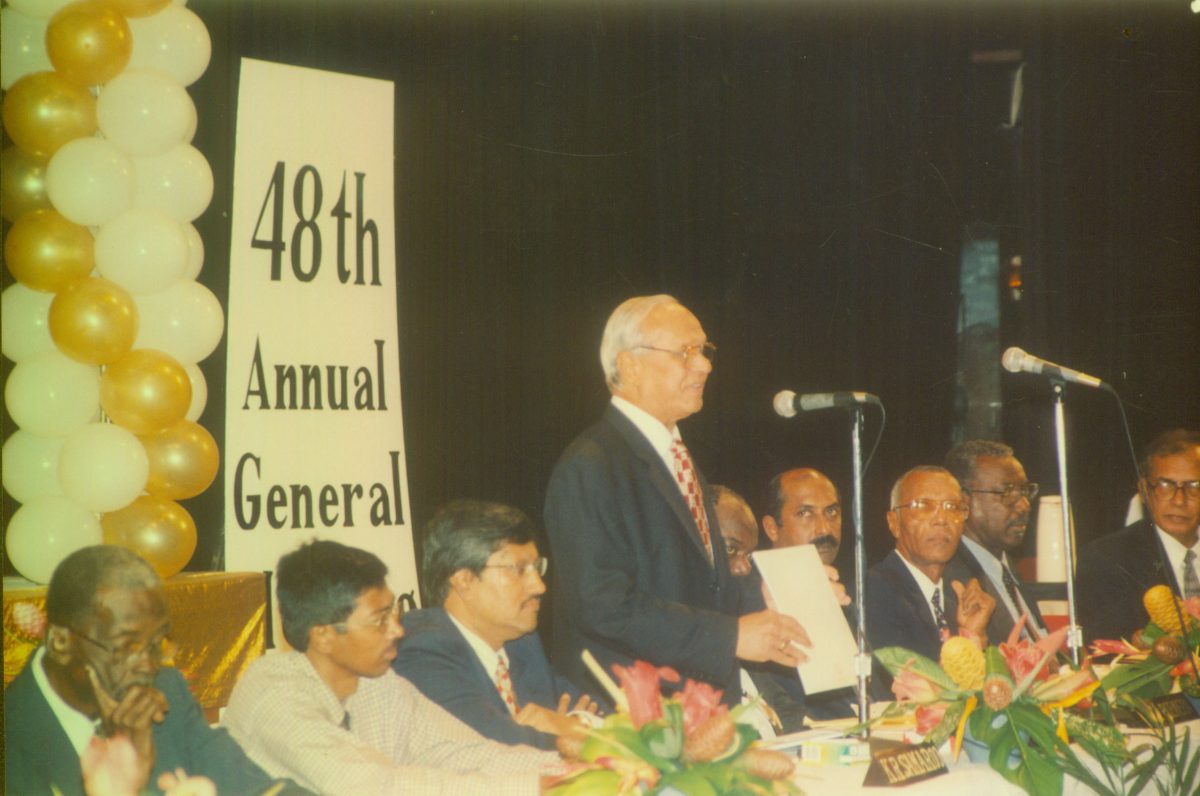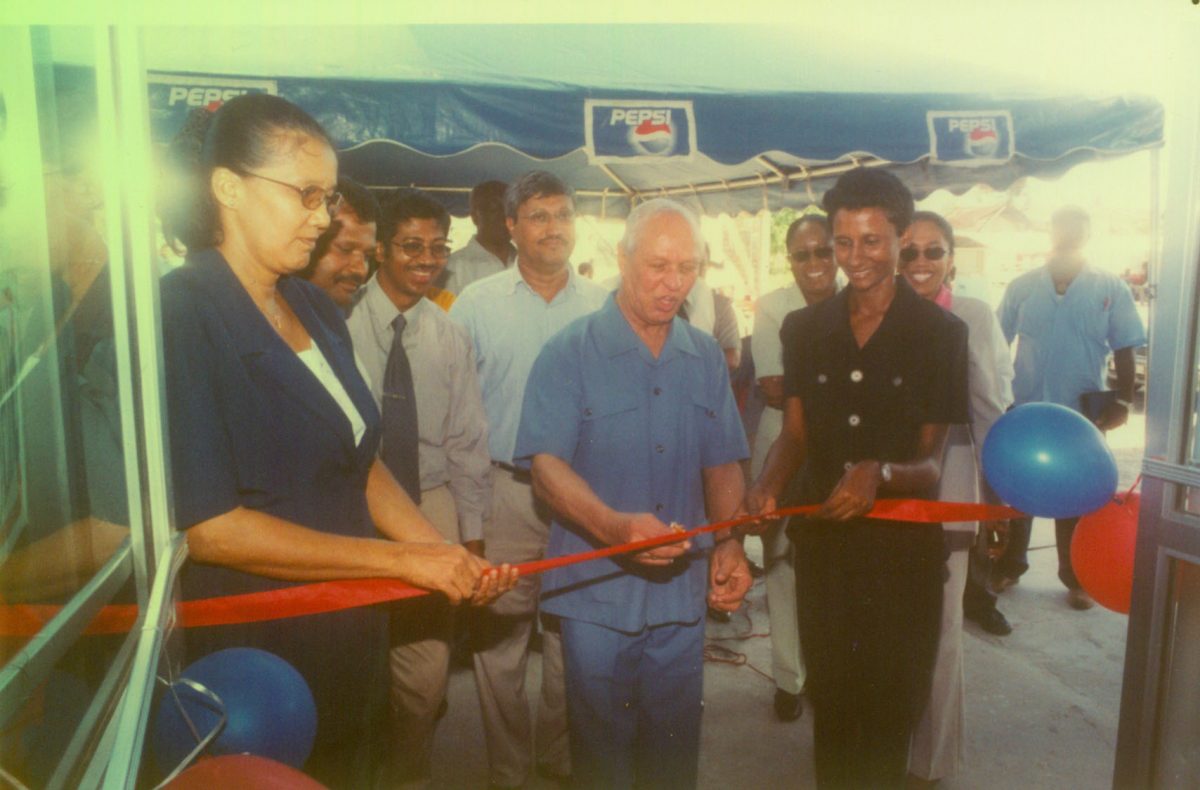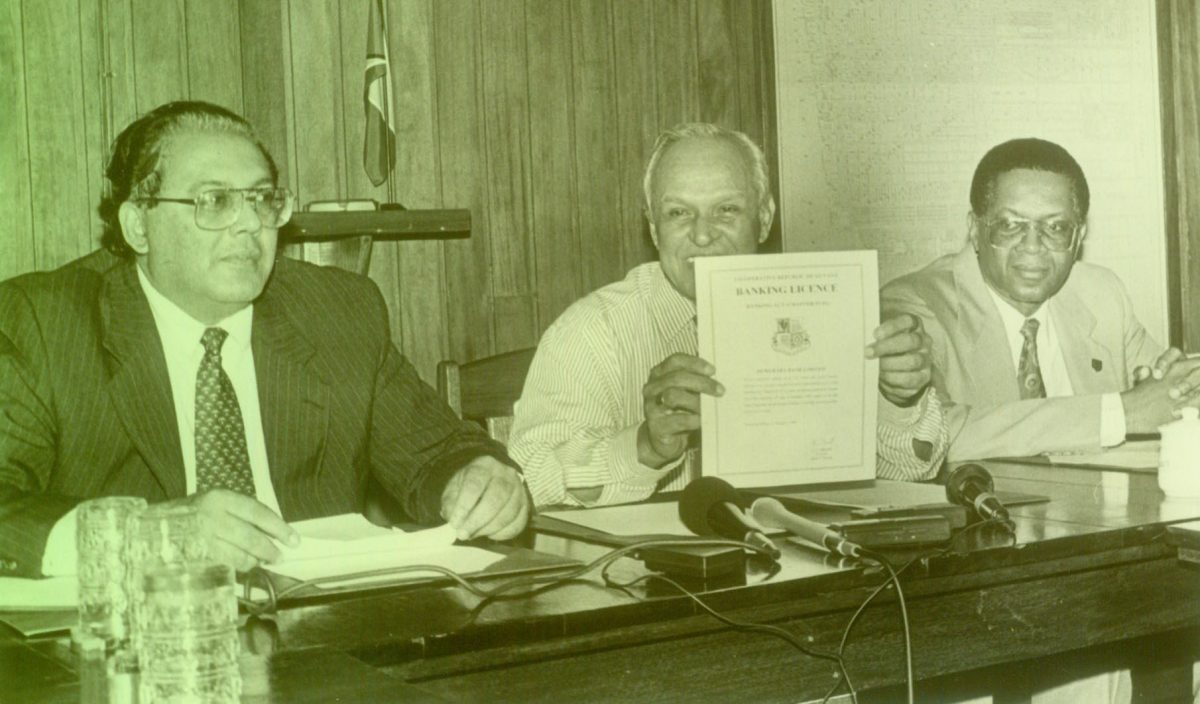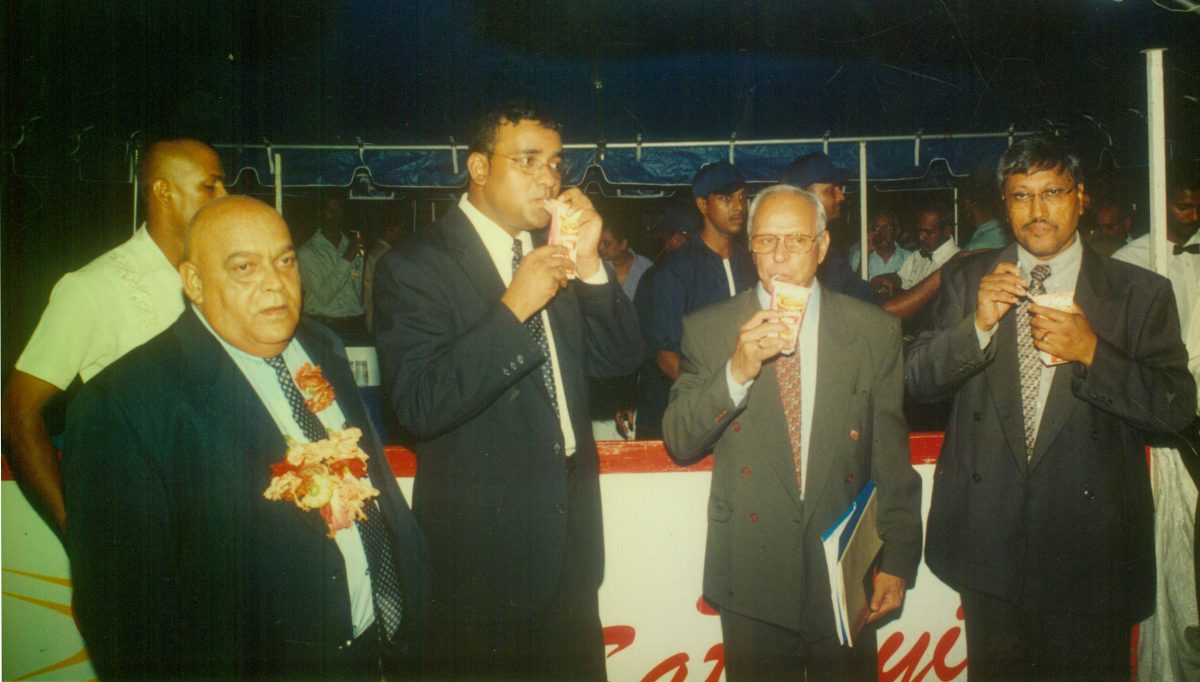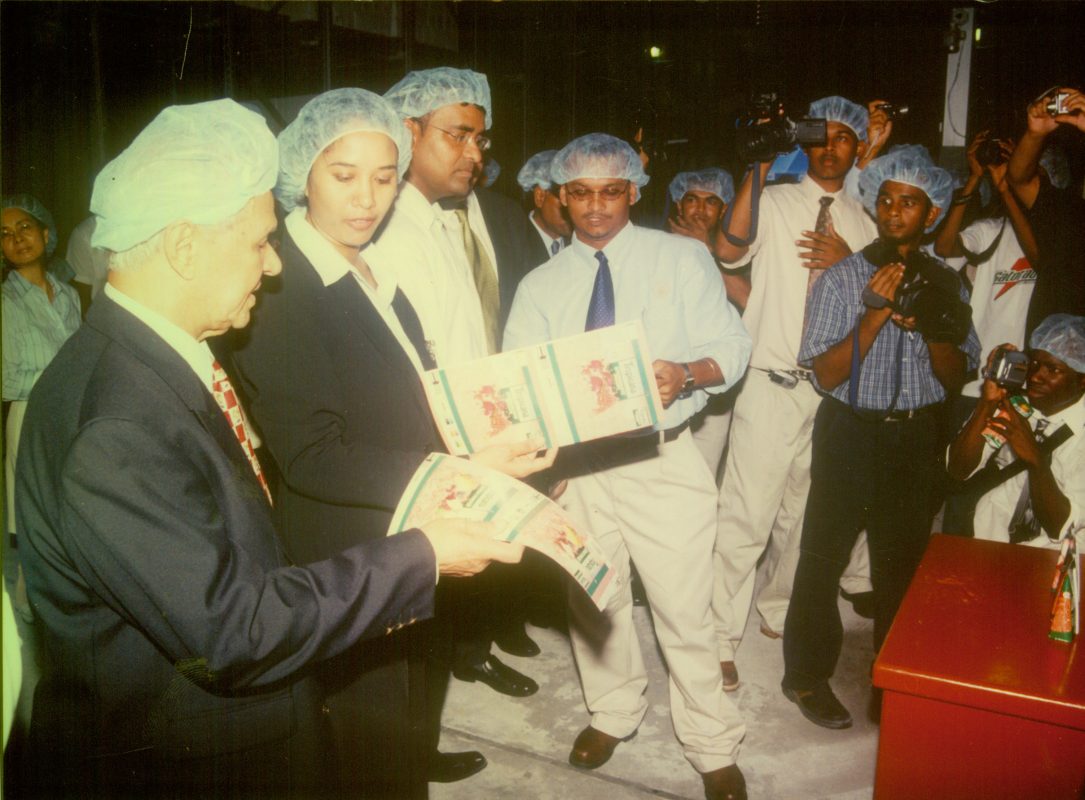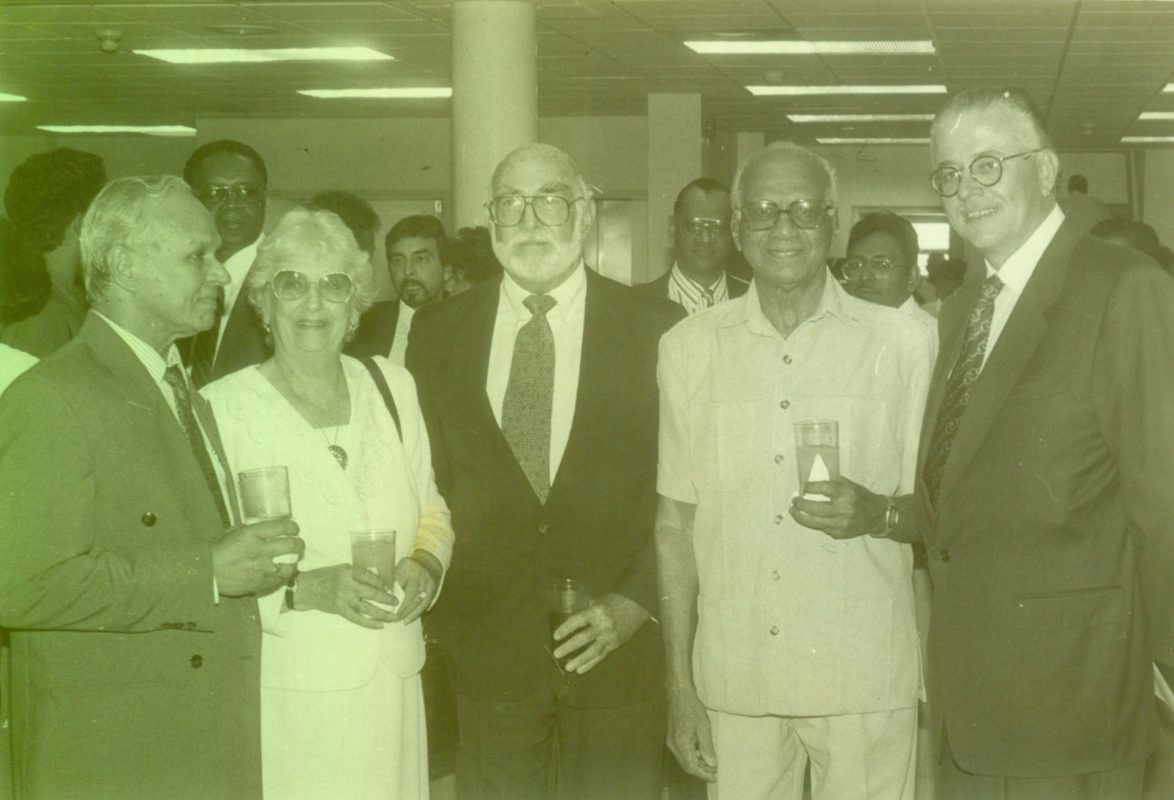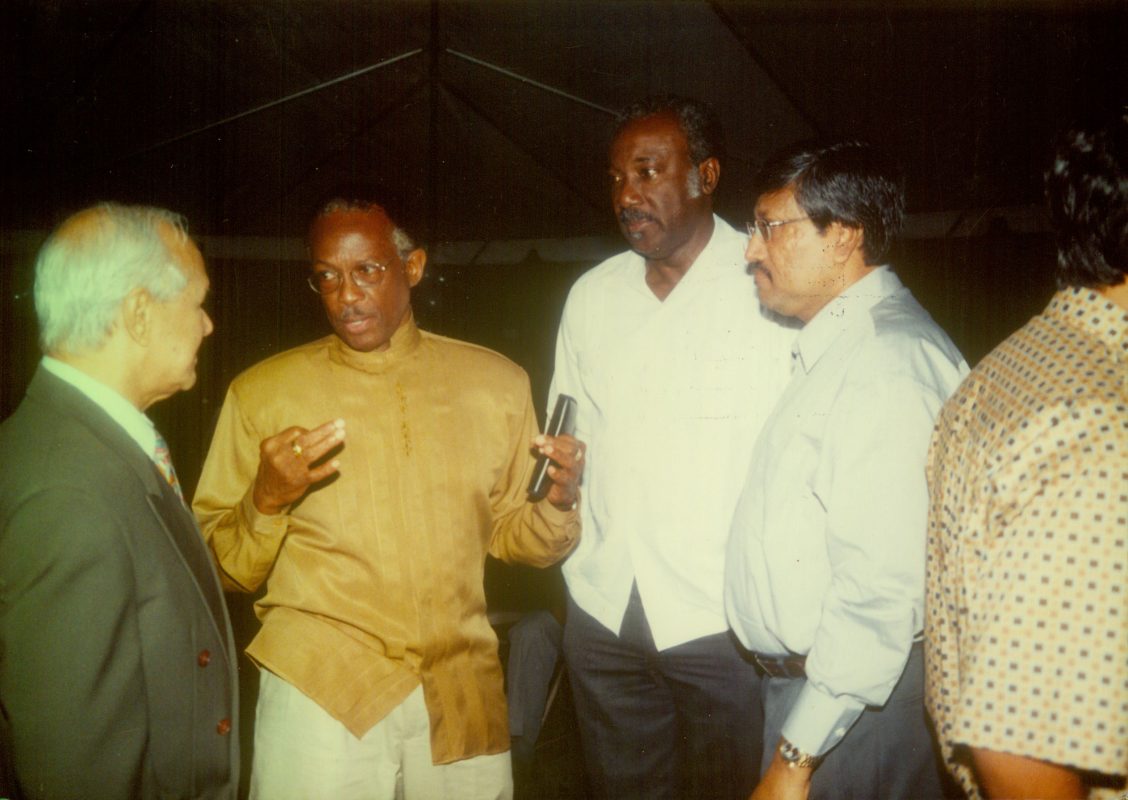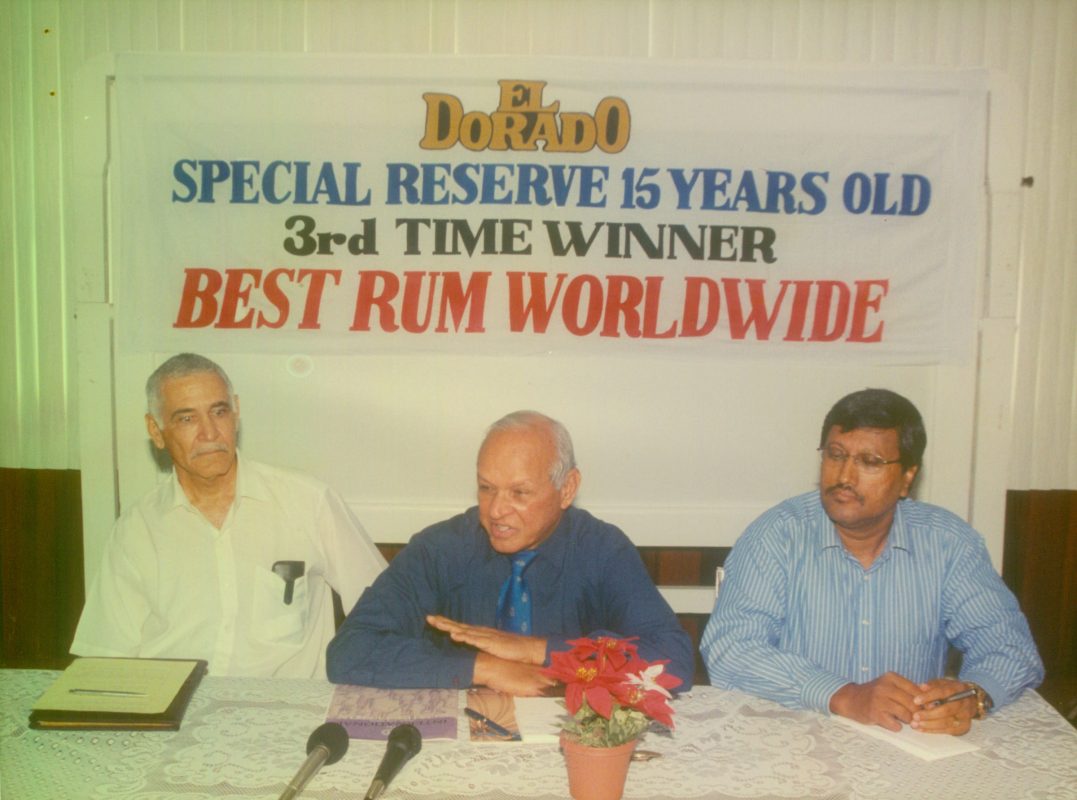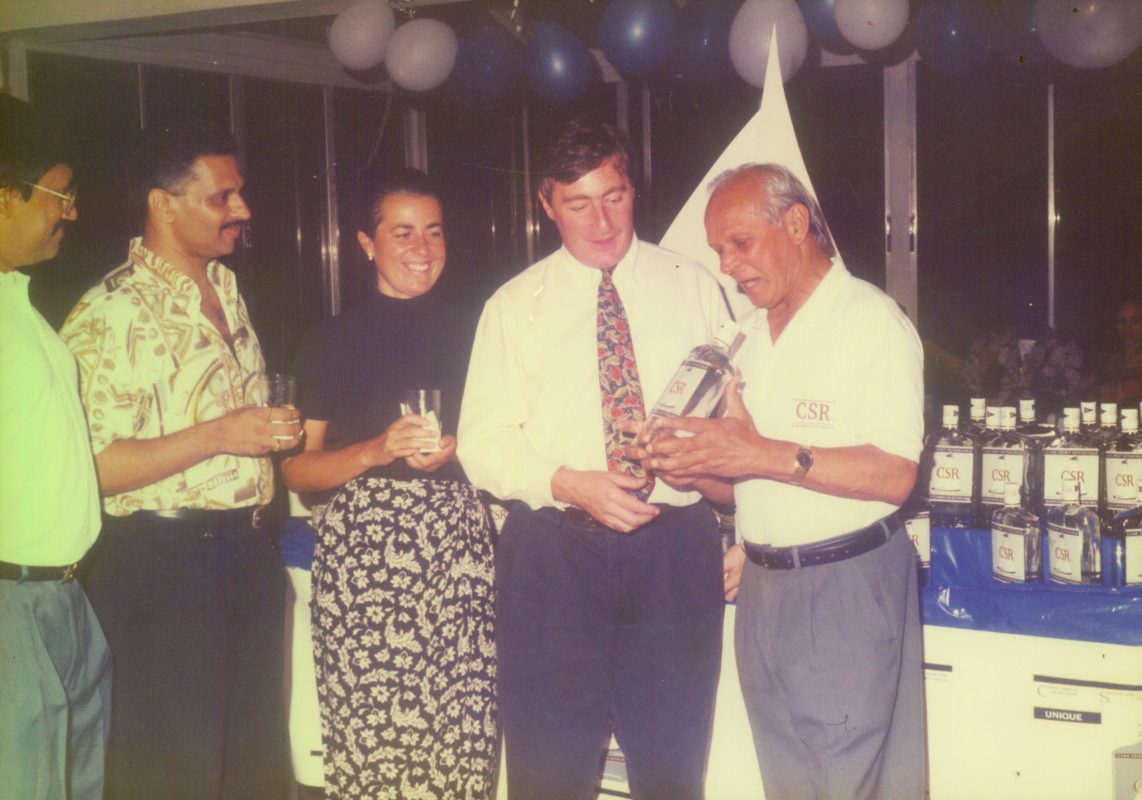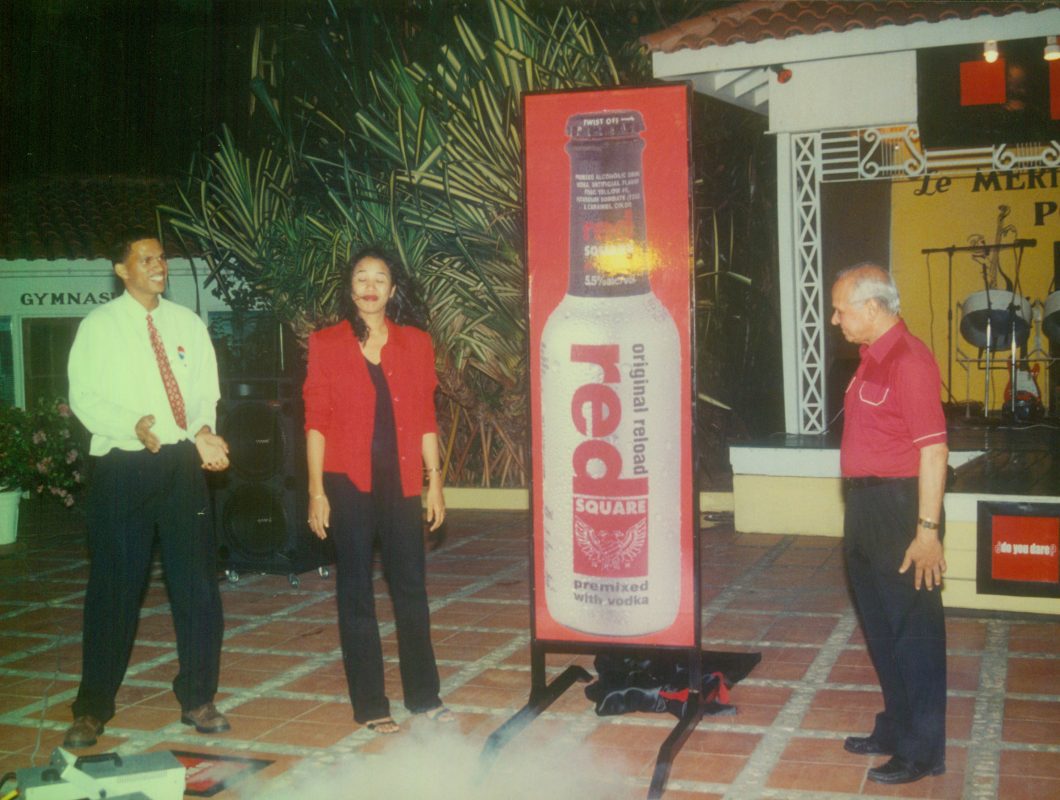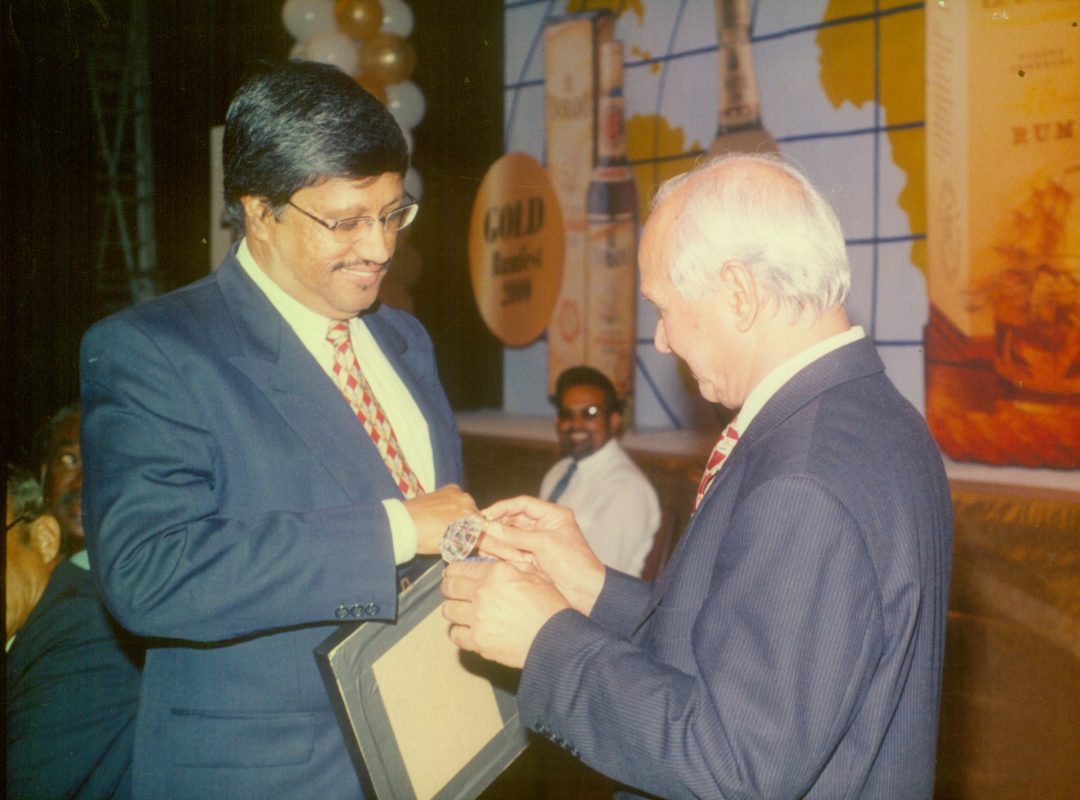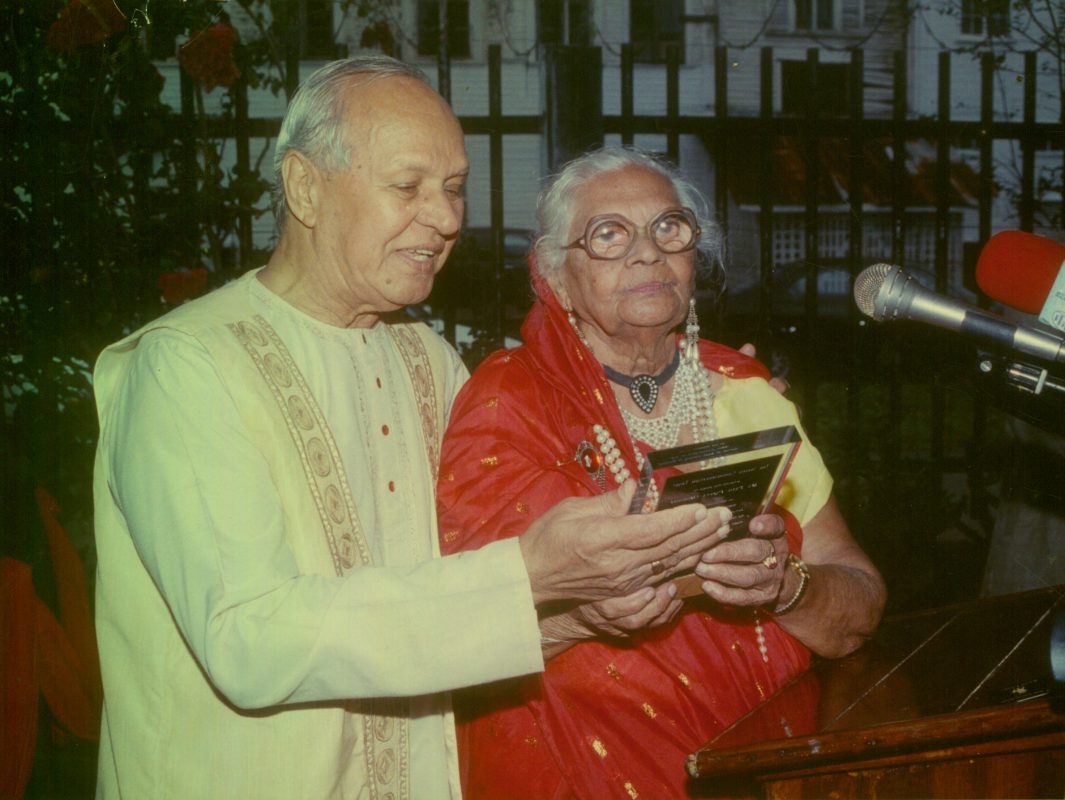A celebration of Yesu Persaud’s 90th birthday in 2018 gave intimate glimpses of the early motivations behind his success and the humility and tenacity that always remained with him.
The University of Guyana’s Philanthropy, Alumni and Civic Engagement (PACE) event: ‘Dr Yesu Persaud; A Life of Audacious Authenticity in Business, Entrepreneurship and Civic Life’ at the Pegasus Hotel was held to mark Persaud’s 90th birthday and the start of a series of heritage lectures by PACE.
One of those persons who spoke was retired Major-General Joe Singh who read excerpts from Persaud’s autobiography, Reaching for the Stars – Volume 1, and Volume 2, to describe his transition from childhood to youth and adulthood.
At Grove Primary School, Singh related, Persaud became friends with a classmate in standard two by the name of Ovid Matthews, the son of the dispenser and bush doctor Albert Matthews.
Persaud wrote, “Ovid told me he loved roti and curry. I mentioned it to my mother who immediately told me I should invite Ovid for dinner. She personally welcomed him. She knew he had never visited an estate family in their logie dwellings and wanted him to feel at ease. By the end of the meal, he was laughing and joking with my mother.”
Two weeks later, Persaud was invited by Matthews’s mother to have dinner at their house.
“I sat between Mrs Matthews and Ovid and the food was served by a maid in full uniform. I was flabbergasted. It was my general belief that only the white expatriates in the overseas quarters had cooks and maids. Here was an Afro Guianese family, who not only had a maid but a cook also. In those days, Indian and African people lived peacefully together, often side by side in the same villages.”
His great grandfather, Persaud wrote, had adopted an African boy after both his father and mother had died.
At 15 years, Persaud was one of two students to pass the school-leaving exams. It was the first time that someone in his family had passed the examination and the family held a jhandi to celebrate as it was seen as a success for the entire estate. People visited the home to congratulate Persaud as he was placed at Central High School. On his first day at school, he was surrounded by a group of boys who wanted to know his background. When he told them his parents were sugar workers, Persaud related, one of the boys shouted, “Sugar workers are cane cutters. You are one of the estate people. What are you doing in high school?”
Persaud said he almost lost his temper and shouted back, “What is wrong with sugar workers? All of your parents came to this colony as sugar workers and all the people in this country, black, brown, yellow were brought to the colony to work on the sugar estates.” It was his first taste of discrimination and it began to shape his life along the path of human rights, Singh noted
He eventually quit school and landed a job at the age of sixteen in 1944 during World War II at Atkinson Airfield as a KP. He said he did not know what KP meant until he was sent to the canteen and bar where he was told he was the kitchen police. After leaving the job in March 1945 because of malaria, he helped out in a grocery store in Stabroek.
The exposure to discriminatory employment requisites influenced him in later life to be an advocate for the dignity of labour, Singh had said in 2018. These experiences and attributes provided him with the foundation on which to survive and excel in London, England when he went there in his 20s to continue his studies.
Analysing Persaud’s life on the sugar estate, Singh said that he humbled himself without losing his dignity to earn the admiration and respect of his functional superiors who then presented him with other opportunities and higher responsibilities. “He understood the concept of justice, fair play, the dignity of labour, respect for diversity of ethnicity, religion and culture and he actively embraced and practiced these values in his interpersonal relations and in his management styles,” he noted.
After seven years in a variety of jobs on the Diamond Estate, Persaud decided he had to review his life and his situation.
He realized he was one of 3,000 workers on the estate most of whom would slave away for the rest of their lives and he had to escape from “the tentacles of cane sugar.” Opportunities were limited in Guyana since the colour bar was a major feature of the employment in Georgetown by the larger firms and he decided to work and study in the United Kingdom and make a new life for his family.
At age 27, he was “fully grounded in the estate system, its culture and dynamics,” Singh said, “and he had already benefited from his parental upbringing and the attention and support from the extended family. He took his education seriously. His friendship extended to other ethnic groups. He was unafraid of diverse placement opportunities on the estate in small family-run businesses and in the large and complex military base at Atkinson Field. He spoke up for what he knew was right and demonstrated at an early age his interest in a system of approach to management which favoured people-centred human resources style of interpersonal relations.”
In London and away from the family structure, he became depressed and wanted to return to British Guiana, but remembered the teachings of Buddha, to wit: “The greatest of conquest is the conquest of self. If a man conquers a trillion things in the world, he is no conqueror unless he conquers the self within him.”
Many of his generation would have given up and considered their station in life bound to the estate and rose to the highest station possible, that of field supervisor, Singh said, but instead Persaud seized every opportunity that presented itself to learn and mastered his trade or portfolio of responsibilities to reach the zenith of business.
Persaud’s personal example of integrity, forthrightness, lack of an ostentatious lifestyle and deficiency of arrogance, Singh said, “makes him a revered exemplar of all those who had an opportunity to interact with him and benefited from his mentoring, counselling and guidance.”
Return
On his return from England, Persaud was made executive chairman of Diamond Liquors Limited (DLL) – a forerunner of Demerara Distillers Limited – and managing director of Demerara Sugar Company in 1975, during the experimental days of cooperative socialism.
DDL Chief Executive Officer Komal Samaroo, who worked with Persaud for over 40 years, at the 2018 function spoke of the first ten formative years of DDL and working alongside Persaud.
DLL had been acquired by the Forbes Burnham government as part of the nationalisation of Jessels Holdings. In 1976, the Booker Group of Companies, where Samaroo worked, was also acquired. The liquor interests of the two groups were combined under Persaud’s chairmanship to lead the business forward, Samaroo said.
Samaroo at that time had said he was on the verge of qualifying as a professional accountant, but was yet to complete his studies. “He [Persaud] instructed my bosses, without knowing who I was, to send me to England to complete my exam. Forty-two years later, I am still paying back for that,” he said, to the amusement of the audience.
In those first ten years, Samaroo said, Persaud focused on corporate restructuring, initiating human resource and growth strategies that are responsible for DDL being what it is today.
GUARD
In July 1990 Persaud was a rising star of the civic reform movement Guyanese Action for Reform and Democracy (GUARD) and was greeted thunderously at GUARD rallies and some predicted that he could have posed a threat to traditional political leaders. At that time observers had linked the PNC government’s blocking of his move to expand the working capital of DDL to his GUARD affiliation.
In an interview with Stabroek News in July of 1990 Persaud had said that one of the reasons for the success of the companies he ran “is that we have been free to do our own thing”.
“I am not one of those who take instructions easily, especially when I know these are not right,” he had said at the time.
He has called for the scrapping of the then National Service and his open criticism of the service had echoed deep sentiments among many but only he had the courage to speak up while others swallowed their concerns.
“I feel a lot has gone wrong in the last many years, particularly as a result of ideology and having the wrong man for the job.
“This has caused so much destruction in many of the major industries that it would take millions in hard
currency to replace. It is going to be a hard struggle to rebuild but you need the goodwill of the people.
“This has been lacking over the years- there is no confidence and motivation. We had the best education system in the Caribbean, now we are the most backward. We had the best managers and they are all overseas.
“People want to see something happen, they have been left out for so long. One sees this in the GUARD rallies – they want to have a say in the affairs of the country again.
“The policies of all parties have really let them down. I have been talking to people and they have been saying they ain’t staying here.
“We got to reverse the trend,” Persaud had said in that 1990 interview.
Astute
In a February 2012 interview with Stabroek News, Persaud had refused to take credit for DDL’s huge success as he pointed out the success must be credited to team work. At the time he had said that astute management under difficult conditions, as well as projecting where the company should be going kept it in the competitive lane, seeing it move from being a company to becoming a conglomerate and one of best known businesses in Guyana.
“If you are not able to project and predict where you are going, how you are going to get there? You are going to fall by the wayside, and we were able to survive many problems…” Persaud had said in that 2012 interview.
Persaud had had to at times wage public wars with those in government to protect the company’s interest.
“But sometimes you have got to stand up and tell the politicians as it is,” he had said at the time adding, “I have to do it because I represent twelve hundred people who have families, and those families are important, and if we want to keep those people work[ing] for us we have to protect them…”
Persaud, who had worked during the tenure of all the presidents of Guyana up to the point of that that 2012 interview had pointed out that the management of DDL did not run a government organization, “where people can do as they like, come as they like; we run a business and business has to be run with strict business lines and we don’t tolerate nonsense from no one…”
He had said at that time that he had been able to build that team spirit over the years, coupled with his open-door policy, of which any aggrieved employee, regardless of their status, could take advantage if they were not satisfied with their manager’s ruling.
In 1994 Demerara Shipping and Distribution Services Ltd (DSL) were launched under DDL, and both companies have been thriving. In that same year the company commenced producing its own soft beverages; in 2003 the Topco fruit juice company was launched and there is also Diamond Fire & General Insurance. There is also Demerara Bank which is a separate company and today is very successful. The Institute of Private Enterprise Development (IPED) was also started by Persaud in 1986, and Persaud had said he considered it to be “my baby.”
Persaud in 2012 had boasted that El Dorado rum – which now also includes the 3 year, 5 year, 21-year-old, 25-year-old and 50-year-old – is the only flagship brand out of Guyana that is known internationally. More importantly, the rum is the only brand that has won the best rum in the world category for over ten years consecutively. He had said that the company’s biggest success story though, is its Ivanoff vodka.
At that time he had said that every year the company grants several scholarships to the University of Guyana and even overseas, and the company takes on about eight to ten graduates as trainee managers annually. But many of them will spend compulsory periods and then they leave, “for what they call greener pastures. “
“This country can’t afford to lose anyone; we are short of people. You may say yes, we have a great deal of unemployment but we have the unemployment in areas where skills are not available. Those people have to be skilled, there is tremendous shortage of skills in this country,” the business tycoon had said. He went on to remark that even drivers are sometimes hard to find.
‘Not to bow’
In that 2012 interview Persaud had described himself as one not to bow to anyone, and because of this he may have stepped on quite a few toes in his lifetime. He pointed out that he lived through the colonial times in this country and he does not want some of the country’s people to behave as colonials.
“I remember the days when in Georgetown you couldn’t get a job if you are black or you are an Indian because those jobs were all reserved for the local whites or the imported whites,” he recalled.
He said he has stood up to politicians, and the infamous incident at the Pegasus with former President Bharrat Jagdeo then came up. In 2008 at the launching of the Guyana Times one of the Queens Atlantic Investment Inc (QAII) projects, Jagdeo had berated Persaud for asking that the tax concessions granted to this investor be accorded to others.
The former President told the audience that Persaud’s comment had exposed his ignorance of the tax laws. Jagdeo went on to say that the concessions had been granted on the basis of QAII’s pioneering industry status. In the end, however, the government was forced to amend the Fiscal Enactments (Amendment) Act 2003 to legitimize the planned tax concessions it had granted to the investor.
“I was proven right because I know what I was talking about, and that gentleman didn’t know what he was talking about at all,” Persaud said during the 2012 interview with a small laugh.
He recalled that he did not respond to Jagdeo’s comment at the time and “afterwards he [Jagdeo] had to wallow in his own folly because he had to change the law.”
“I worked through all the presidents… and the big thing here is that people tend to think that they would last forever; nothing in this world lasts forever and we are all transitory and when they forget that they are forgetting themselves. You may be big today but tomorrow you may be small as nothing,” Persaud said.
Persaud said he went through “hell” as he fought for free and fair elections along with others and all the work they put in for a change has gone to naught.
“My life was at risk in 1991 but I persevered… I did what I had to do, I was hated for it but I thought we would have had a change. But the change, yes there was a little change with [Cheddi] Jagan but after he went and he didn’t name a successor… we have never seen the change we really wanted.
“We are still a country ruled by a clique and that is sad,” he had said in 2012.
With a sad shake of the head Persaud said that “absolute power corrupts,” before ending that 2012 interview.
